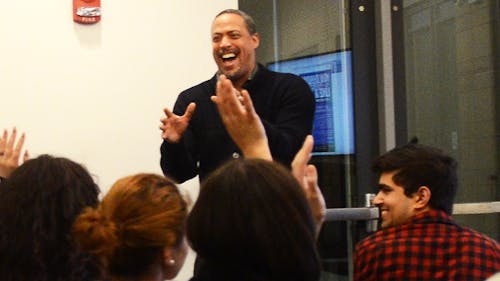Former NFL quarterback Don McPherson visits Rutgers to speak on masculinity, sexual violence

“You throw like a girl” is a phrase former NFL player Don McPherson is fighting to end the use of.
McPherson, a College Football Hall of Fame member and anti-violence activist, held a discussion focused on language that set a narrow definition of masculinity and degrade women at the Rutgers Honors College on the College Avenue campus.
The workshop was intended to nurture positive language and create a healthy definition of masculinity in order to end sexual and domestic violence.
The overall aim of the workshop was to initiate a conversation, which is the first step in the effort to prevent sexual violence against women, McPherson said.
“The objective is to eliminate all forms of male violence toward women,” McPherson said. “I have no expectations that this will change tonight but the idea is to get people part of the conversation, part of solution.”
It was interesting to hear what a sports figure, a "perfect model of masculinity," had to say on the subject of gender roles, said Rishi Narayan, a School of Arts and Science senior.
“I've read a lot of theory on gender roles. I do not know if he will change my mind but I think I will have fun and learn something and maybe incorporate it into my framework,” he said.
Kyle Knotts, a School of Arts and Science first-year student, came with his class and did not expect this conversation to change his opinions because he does not view himself as sexist.
But there is a clear problem on college campuses, McPherson said. And men have to be part of the solution.
“To think there are people who do not feel safe, that has to stop,” he said. “College is a place of growth and exploration, but with that freedom comes responsibility.”
Violence on campus overwhelmingly comes from men, yet violence against women is seen in society as a “women’s issue," McPherson said.
In order to prevent a problem, he said one must look at who is doing it and why.
The narrow definition of masculinity that men are raised to fit is part of the problem, McPherson said.
“We don’t raise men to be men, we raise men not to be women,” he said.
Derogatory terms for women are the largest insults to boys growing up, he said.
Identifying the culture that leads to sexual assault is part of the solution, which can be done by expanding one's definition of masculinity and stopping your friends from objectifying women, he said.
The incident when former Rutgers football player Ray Rice assaulted his girlfriend in 2014 initiated a conversation about sexual assault, McPherson said. But this conversation was not productive because it was focused on the wrong issues.
The blame was put on his girlfriend for staying with him, he said. Nobody questioned Rice about his actions but did ask when he would play again.
“This conversation proved one thing,” McPherson said. “We have opinions about it, attitudes about it, (and) we have to make that conversation productive and honest.”
McPherson believes people were raised not to discuss these issues, and the silence allows these issues to continue.
“It's not all men who are the problem, but in the silence of the rest of us those men have impunity,” he said. “In the silence of the rest of us, those women are alone.”
Men need to have a conversation about domestic abuse and sexual assaults, McPherson said.
“That's why it's revolution everyone's involved,” he said. “It's not something that ends tonight, It’s ongoing.”
____
Noa Halff is a School of Arts and Sciences sophomore. She is an associate news editor for The Daily Targum. Follow her on Twitter @NoaHalff for more.



